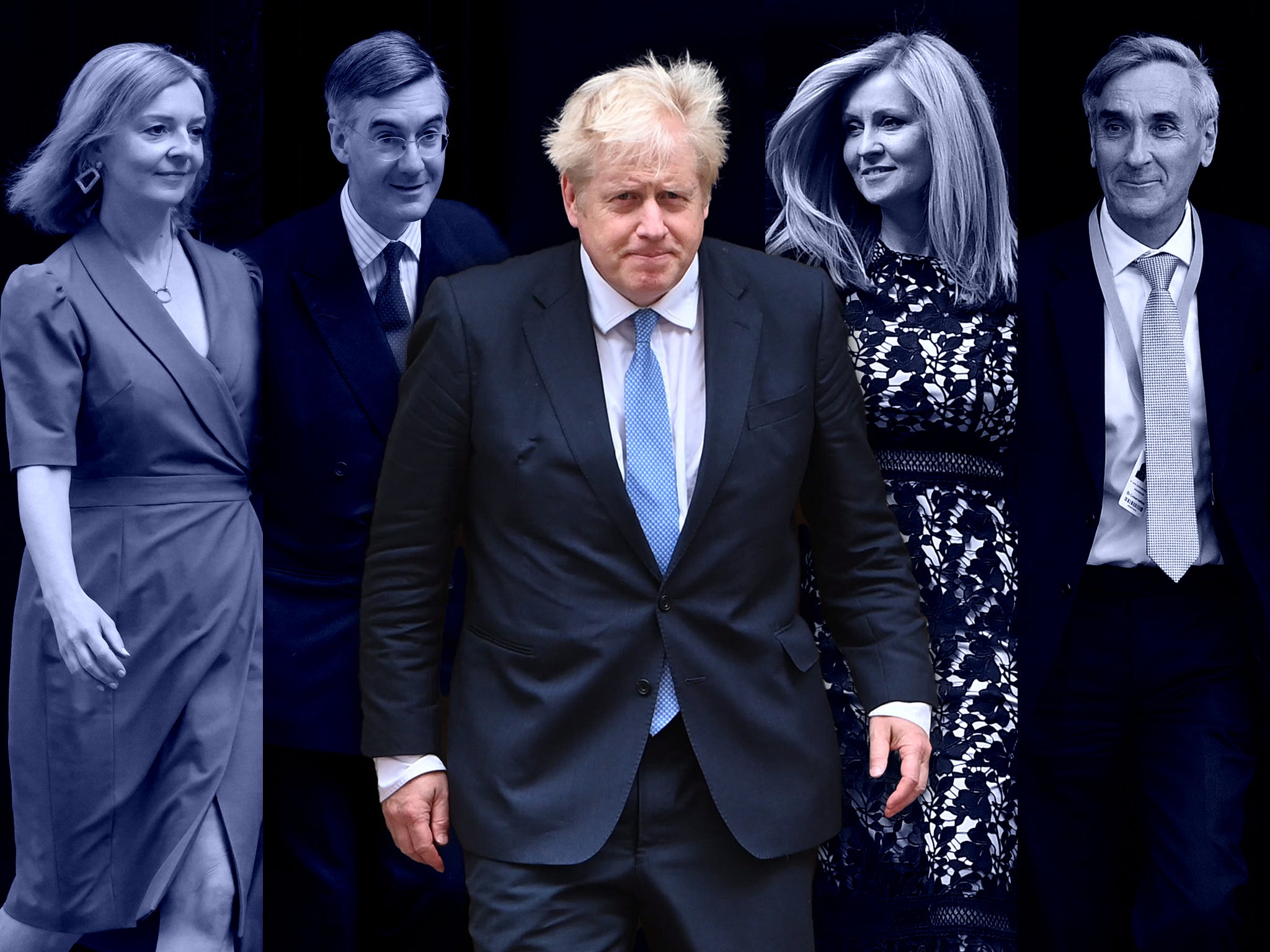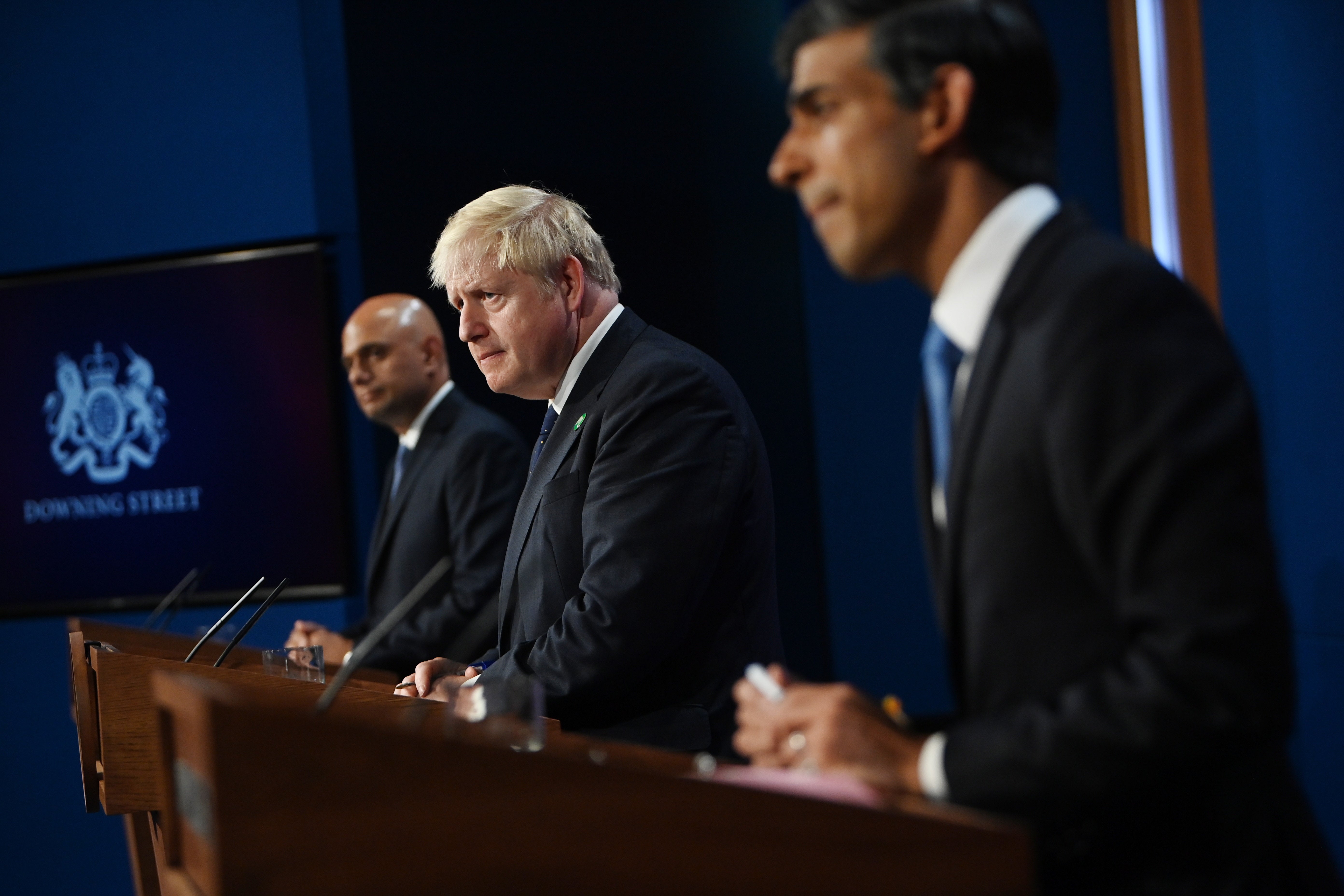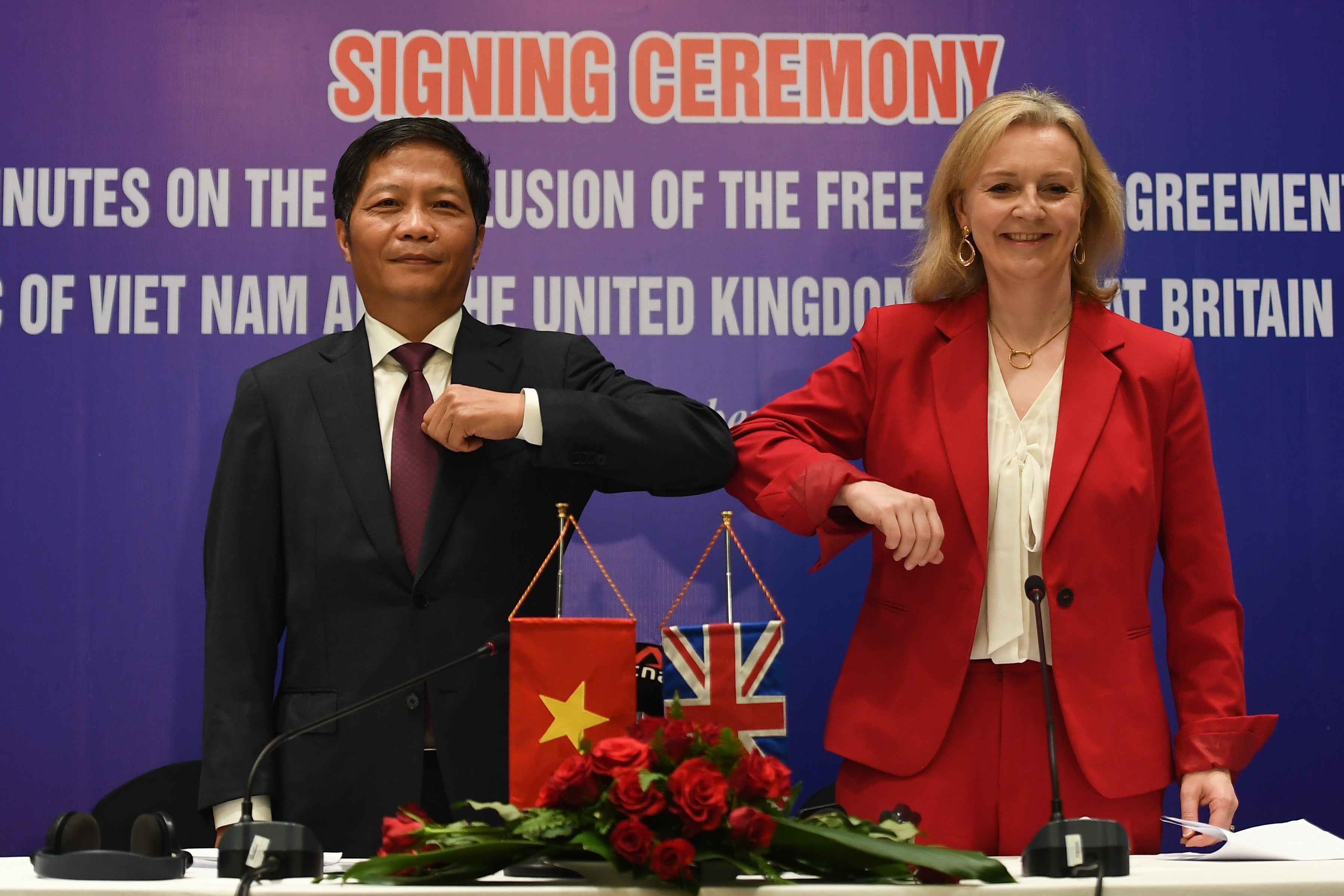Tax rises and the overmighty state pave the way for Tory split
Like the Brexit deal, the decision to raise taxes was rushed through at the last minute. But the repercussions of one of the biggest tax rises in history will take much longer to play out. John Rentoul reports


The three mice that roared at the first in-person cabinet meeting this year were Liz Truss, Lord Frost and Jacob Rees-Mogg. Presented with the plan to raise taxes to pay for the NHS backlog and new funding for social care, I understand that they asked sceptical questions. The subtext might have been, “Have you taken leave of your senses, prime minister?” But the actual words were mild, possibly suggesting that ministers ought to think carefully before risking the Conservative Party’s reputation for low taxes and personal responsibility.
They certainly contrasted sharply with the words of the anonymous cabinet minister who spoke to The Sunday Telegraph two days earlier to say: “Putting up national insurance would be morally, economically and politically wrong.” If that was Truss, Frost or Rees-Mogg, they had obviously since decided to follow the Nadhim Zahawi doctrine. Zahawi, the vaccines minister, told the House of Commons on Thursday that a vaccine passport scheme “goes against everything I believe in”. Next sentence: “But it’s the right thing to do.” (That was before the prime minister abruptly dropped the idea.) And if The Sunday Telegraph’s source was a different cabinet minister, they decided that the bravest thing to do was to say nothing at all.
Whoever it was, the timid reservations that were voiced at the cabinet meeting were lost in the noise of the machinery of government as it ground into gear: a statement by the prime minister in the Commons, a news conference held by the three ministers responsible for the scheme, and a vote in parliament the next day. Boris Johnson had followed the precepts of Fabius Maximus, the Delayer. He had delayed and delayed and delayed, but when he struck, he struck hard.
When he became prime minister he said he had a plan for social care. When he won the election he promised to unveil it. Then came the pandemic, and although the NHS wasn’t quite overwhelmed, it is now just too small to cope with the demands on it. So the social care plan was wrapped up in a bigger plan to raise taxes to expand the NHS, with some of the money gradually switching to social care as the backlog cleared. It was all ready to go before parliament adjourned for the summer recess, but Fabius Johnson delayed again.
A few big decisions were taken at the last minute. The size of the increase was 1.25 percentage points on rates of national insurance contributions, rather than 1 per cent, and it would apply to the earnings of people above state pension age, who are currently exempt, as soon as the Treasury can change the computer systems, namely in April 2023. And the cap on social care costs – above which the state will take over – was set at the last moment at £86,000, an un-round number that suggests a hard-fought negotiation between departments.
The broad outline of the plan had seeped out before the summer break – a rise in national insurance to pay for the NHS backlog and a social care plan – prompting a lot of sage commentators to shake their heads knowingly. They pointed out that when Tony Blair and Gordon Brown did something similar in 2002, they spent years preparing the ground, conducting a review of the NHS, the Wanless review, and that it was only because of all this careful pitch-rolling that they managed to pull off what would otherwise have been an unpopular tax rise.
Never mind that, Boris Johnson seems to have said. He was quite prepared to copy New Labour in putting up taxes to pay for the NHS, but “roll the pitch”? Give every opponent and vested interest a chance to throw up objections and sow doubt and confusion? He didn’t even consult the cabinet in advance. Once the three of them – Johnson, Rishi Sunak and Sajid Javid – had completed the final negotiations over the weekend, the plan was put straight to cabinet, the mice squeaked slightly but failed to resign, and 30 hours later it was voted through by the House of Commons with a government majority of 71.

It wasn’t quite over then. Last night, the government pushed the Health and Social Care Levy Bill through the House of Commons to translate last week’s vote into legislation, but by striking so quickly last week, the chief whip had drawn the sting of the rebellion among Conservative MPs. The bill has now completed all its Commons stages in a single day. This is unusual for such an important bill, but one way that Johnson manages the Commons is to give it little time to catch its breath. The Brexit trade deal, for example, a huge and complicated piece of legislation, was pushed through in a single day, 30 December last year, less than 48 hours before it came into effect.
The repercussions of one of the biggest tax rises in history are not over, either. The three slightly dissenting ministers at the cabinet meeting are merely the harbingers of the coming Tory clash – along with the 10 Tory MPs who voted against the government last night, and the 20 or so more who abstained.
There is certainly a part of the Tory party that is in ferment, deeply unhappy with Johnson, and incensed by the ‘socialist’ decision not just to raise taxes but to have the state take more of a role in people’s lives
The 10 who voted against are hardcore, including the five who voted against last week: Christopher Chope, Philip Davies, Neil Hudson, Esther McVey and John Redwood. They won’t be expelled from the Conservative Party, although that was one of the threats that was put about on the prime minister’s behalf, along with that of a cabinet reshuffle. It was suggested that Johnson might make the vote on the tax rise an issue of confidence in the government, which would mean any MP voting the wrong way would have the whip removed and therefore be ineligible to stand as a Conservative at the next election. But it wasn’t necessary.
The Tory MPs who abstained are possibly more interesting. They included a number who might be a guide to the future ideological direction of the party. Jake Berry, MP for Rossendale and Darwen, was an ally of Johnson’s before Johnson became prime minister. He was then minister for the “northern powerhouse”, and is now chair of the Northern Research Group, which is copying some of the tactics of the European Research Group to push the interests of Tory MPs representing red wall seats.
Dehenna Davison, who took the Labour seat of Bishop Auckland in 2019, is one of them. She abstained last week before voting against the bill last night. She is co-chair of the Free Market Forum, a new group that is being launched today at an event at which Liz Truss, the international trade secretary, is the guest speaker. A small example of the kind of networking that may shape a future leadership contest.
Truss is popular with Conservative Party members – the selectorate which has the final say over who the next leader should be (as long as one of the two candidates chosen by MPs doesn’t drop out, as Andrea Leadsom did in 2016). She enjoys a plus 85-point net “satisfied” rating, according to the monthly Conservative Home poll of party members. The next most popular cabinet minister is Rishi Sunak, on plus 75 points.
This could set up an intriguing contest between an opponent of the tax rise and the architect of it. Sunak has always been described as a Thatcherite and an advocate of fiscal responsibility. But, although he was a Leaver and Truss was a Remainer (the previous test of ideological purity), it looks as if Truss is positioning herself as the voice of the low-tax true believers. There is certainly a part of the Tory party that is in ferment, deeply unhappy with Johnson, and incensed by the “socialist” decision not just to raise taxes but to have the state take more of a role in people’s lives. Often, they are the same people who hated lockdowns as an unwarranted intrusion on personal liberty.

They tend to be more polite about Sunak, partly because he seemed to be on their side in wanting to open up coronavirus restrictions, and partly because he is exceptionally popular with the general public. Yet the chancellor is popular with the voters mainly because he has pursued policies that might have been expected from a Labour government, and he has often used startlingly direct un-Tory language to defend them. It was in his party conference speech last year – albeit to a virtual Tory conference – that he defended furlough as the deployment of the “overwhelming might of the British state”.
He did it again in the Downing Street news conference to set out the tax rise, opening his comments with: “Why do we need to raise taxes? There are three reasons.” Even worse than such blunt clarity, from the point of view of a small-state conservative who might grudgingly accept the political necessity of bailing out the NHS, was his second reason: to pay for social care. “Today we have created an expanded safety net,” Sunak said. “Instead of individuals having to bear the financial risks of catastrophic care costs themselves, we as a country are deciding to share more of that risk collectively. This is a permanent new role for the government. And, as such, we need a permanent new way to fund it.”
These crystal clear sentences are the opposite of what many Conservatives came into politics for. Collective action, and a permanently larger role for the state? That is not what a large and vocal part of the Tory party’s base wants to hear. Of course, the pragmatists among them would accept that the pandemic has been an exceptional event in economic history, and as believers in fiscal responsibility they would dutifully applaud the chancellor’s statement at the news conference: “Borrowing more today just means higher taxes tomorrow.”
Johnson never had much depth of loyalty in the Tory party, which turned to him in desperation when parliament was deadlocked over Brexit. But once he ceases to be popular with the voters he will have no tribe of Johnsonites to fall back on
But balancing the books is not what gets modern conservatives going. Supporters of Ronald Reagan to Donald Trump were more excited by low taxes than by the low public spending that this should have implied. Tories will pay lip service to fiscal responsibility, but mainly to try to portray Labour as feckless spenders. And if, after a crisis and as an exceptional measure, taxes do have to go up, that should be a temporary, reluctant and minimal expedient – not funding “a permanent new role for the government”.
I don’t know if Truss is going to be the candidate that emerges from the small-state agitation in the Tory party to challenge the new collectivism. At one point I thought it might be Jacob Rees-Mogg, as an ideological mirror-image of Jeremy Corbyn, but I don’t think that works. Whoever it is, there is trouble ahead for the top team of prime minister and chancellor.
Johnson never had much depth of loyalty in the Tory party, which turned to him in desperation when parliament was deadlocked over Brexit. The party never had any illusions that he believed in anything much beyond the greater glory of himself. That served the party’s purposes, but once he ceases to be popular with the voters he will have no tribe of Johnsonites to fall back on. Sunak seemed to be more of a real conservative, although he has only been at the top of politics for 18 months, and it may be that with this tax rise he has narrowed his support base sharply.
It could be that the Conservative Party’s natural state is civil war. The civil war that raged over Brexit has ended, but the next war over rolling back the overmighty state – or what Sunak approvingly called the “overwhelming might of the state” – is just beginning.


Join our commenting forum
Join thought-provoking conversations, follow other Independent readers and see their replies
Comments